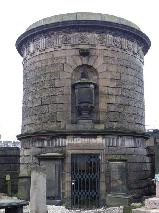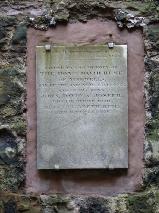Hume, David |
| PHILOSOPHER (SCOTLAND) |
|
BORN 26 Apr 1711, Edinburgh - DIED 25 Aug 1776, Edinburgh BIRTH NAME Home, David CAUSE OF DEATH cancer GRAVE LOCATION Edinburgh: Old Calton Burial Ground, Waterloo Palace |
|
David Hume was the son of the advocate Joseph Home of Ninewells. His father died when he was still a child. He entered the University of Edinburgh when he was only twelve years old. He read widely, but by the time he was 25 years old he had no source of income. He left Scotland to become a merchant's assistant at La Flèche, in Anjou. His attempts to start an academic career failed because he was suspected of atheism. In France he wrote his "A Treatise of Human Nature" (1739-1740) but it wasn't received well. However, his essays were more successful and he found employment as librarian at the University of Edinburgh. His "The History of England" (1754-1761) in six volumes was a bestseller and became a standard work, overshadowing his "An Enquiry Concerning Human Understanding" (1748) and "An Enquiry Concerning the Principles of Morals" (1751). He was invited to Paris by Lord Heertford and from 1763 to 1765 he was secretary to the British embassy. In 1766 he accompanied Jean-Jacques Rousseau to England, but in England they fell out with each other. In 1767 he was appointed Under Secretary of State for the Northern Department, but in 1769 he returned to Edinburgh. From 1771 until his death in 1776 he lived near St. Andrew's Square. During his last year he wrote a short essay called "My Own Life" in which he confessed that his "love of literary fame" had ruled his life. James Boswell met him shortly before his death and Hume told him that life after death was 'a most unreasonable fancy' to him. Related persons • quarreled with Rousseau, Jean-Jacques • was a friend of Smith, Adam |
| Images |
Sources • Daiches, David (ed.), The Penguin Companion to Literature 1, Penguin Books, 1971 • David Hume - Wikipedia (EN) |




